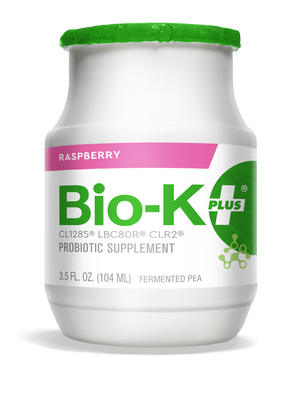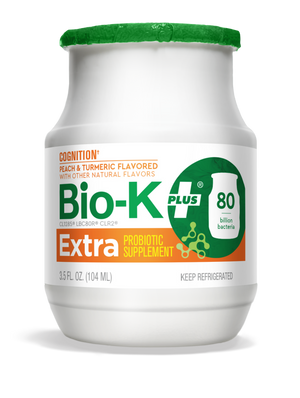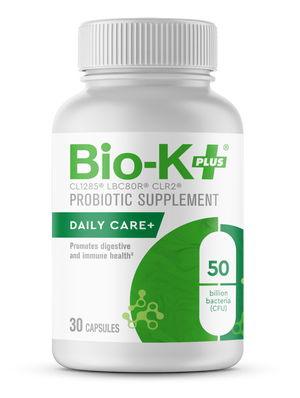Choose Yourself. Choose What you Eat.
The start of any season is a great time to refresh your eating habits and recommit to your health and happiness. It’s not about going on a detox or diet, but gently allowing the gut and body to find balance by incorporating seasonal foods. I have the best results when I eat plenty of raw, cooked, and fermented fruits and veggies, and drink a Bio-K+ fermented probiotic everyday. As a food lover and chef, it all comes back to the food, and the transformative power that fresh seasonal fruits, vegetables, and probiotics have.
Each different season abounds with colorful and vibrant vegetables that are full of antioxidants, flavor, water, cleansing powers, and so much more. Foods like artichoke, beets, asparagus, radish, peas, and greens are all high in vitamins and minerals that help boost our energy and immune system. Even more, these foods are great for our guts. They’re all full of fiber, and some are particularly high in prebiotic inulin (hello, asparagus!). Inulin is another type of carbohydrate that becomes food for our healthy bacteria in our gut, once it reaches the large intestine. Healthy bacteria helps us to digest our food, assimilate nutrients, and maintain a healthy digestive system and immune system. The combination of fiber and inulin (also known as a prebiotic) is the key to maintaining overall gut health, which in turn leads to overall health.
If winter has left you bloated, low in energy, or backed-up, the best thing you can do is eat plenty of fiber from fresh seasonal vegetables and fruit and give your healthy bacteria a boost by taking a daily Bio-K+ fermented drinkable probiotic. Head to your local farmer’s market or local garden to pick up the most colorful and vibrant produce. Back at home experiment with different ways of preparing your veggies. I like to search online for ideas, or try the vegetables raw tossed into a salad or cut up for dipping into homemade hummus.
What’s good for your gut?
Asparagus is the star. It’s great for grilling, broiling, sauteing, eating raw, or just about anything else. Asparagus is high in B vitamins which are a complex of vitamins crucial for energy. It’s also high in vitamin K, which is necessary for blood clotting. Most excitingly, it’s a great source of inulin, that indigestible carbohydrate that healthy bacteria use for food.
Red beets boast some very special phytonutrients called betalains which support detoxification and have antioxidant and anti-inflammatory strengths. To maintain the health benefits in beets it is best to steam them for 15-20 minutes with the skin on, or eat them raw. I love grating raw beets into a salad along with carrots, or marinating steamed beets with dill and lemon juice.
Peas pack quite the fiber punch. Look for them in all of their glorious forms this spring—green peas, sugar snap peas, and snow peas. Garden green peas are usually shelled, and are great in everything from purees to curries. The more delicate snap and snow peas can be enjoyed raw, lightly steamed, or in stir-fries.
Arugula is one of my favorite greens. When it’s fresh and in season it has a peppery and mildly earthy flavor that pairs well in a salad. Of course it’s high in fiber, but arugula is also high in folate, vitamin A, beta-carotene, and powerful cancer-fighting phytonutrient compounds. I love making arugula salads with a light vinaigrette, pumpkin seeds, and lots of other veggies. This green is also great in soups, on sandwiches, and blended into a pesto.
Rhubarb should definitely be on your grocery list. Its high fiber content makes it great for eliminating constipation, and promoting bowel regularity. Rhubarb is also high in antioxidants, anti-inflammatory compounds, and plenty of vitamins and minerals. Though it is a vegetable—technically a leafstalk—rhubarb is most often used in desserts. Try a rhubarb crumble with wholesome spelt flour, oats, and sweetened with maple syrup.
Now, try this tropical “gut friendly” beet smoothie bowl!
Makes 2 bowls
1 Blueberry fermented organic brown rice Bio-K+ bottle
½ cup fresh or frozen diced pineapple
1 banana
½ raw beet, diced
½ cup non-dairy milk
1 large fresh mango, diced, to top
1 cup of your favorite granola
Place the Bio-K+, pineapple, banana, beet, and non-dairy milk in a high-speed blender and blend until creamy.
Pour the smoothie into two bowls and top with diced mango and granola.
Serve immediately.





